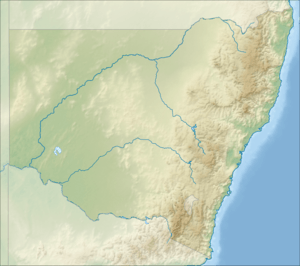Peak River
| Peak | |
| Atkinsons Creek, Baloo Arm[1] | |
| River[1] | |
| Country | Australia |
|---|---|
| State | New South Wales |
| Regions | Australian Alps (IBRA), Snowy Mountains |
| Local government area | Tumut Shire |
| Part of | Murrumbidgee catchment, Murray–Darling basin |
| Source | Bogong Range, Snowy Mountains |
| - location | near Bogong Mountain |
| - elevation | 1,140 m (3,740 ft) |
| Mouth | confluence with the Goobarragandra River |
| - location | near Macks Crossing |
| - elevation | 423 m (1,388 ft) |
| - coordinates | 35°24′56″S 148°26′08″E / 35.41556°S 148.43556°ECoordinates: 35°24′56″S 148°26′08″E / 35.41556°S 148.43556°E |
| Length | 21 km (13 mi) |
| National park | Kosciuszko NP |
 | |
| [1][2] | |
The Peak River, a perennial stream[1] that is part of the Murrumbidgee catchment within the Murray–Darling basin, is located in the Snowy Mountains region of New South Wales, Australia.
Course and features
The Peak River rises below Bogong Peaks, on the northeastern slopes of Mount Bogong within the Bongong Range, part of the Snowy Mountains, contained within the Kosciuszko National Park. The river flows generally north before reaching its confluence with the Goobarragandra River near Macks Crossing.[1] The river descends 720 metres (2,360 ft) over its 21-kilometre (13 mi) course.[2]
See also
References
- 1 2 3 4 5 "Peak River". Geographical Names Register (GNR) of NSW. Geographical Names Board of New South Wales. Retrieved 2 June 2013.
- 1 2 "Map of Peak River, NSW". Bonzle Digital Atlas of Australia. Retrieved 2 June 2013.
External links
- "Murrumbidgee and Lake George catchments" (map). Office of Environment and Heritage. Government of New South Wales.
This article is issued from Wikipedia - version of the 5/3/2016. The text is available under the Creative Commons Attribution/Share Alike but additional terms may apply for the media files.